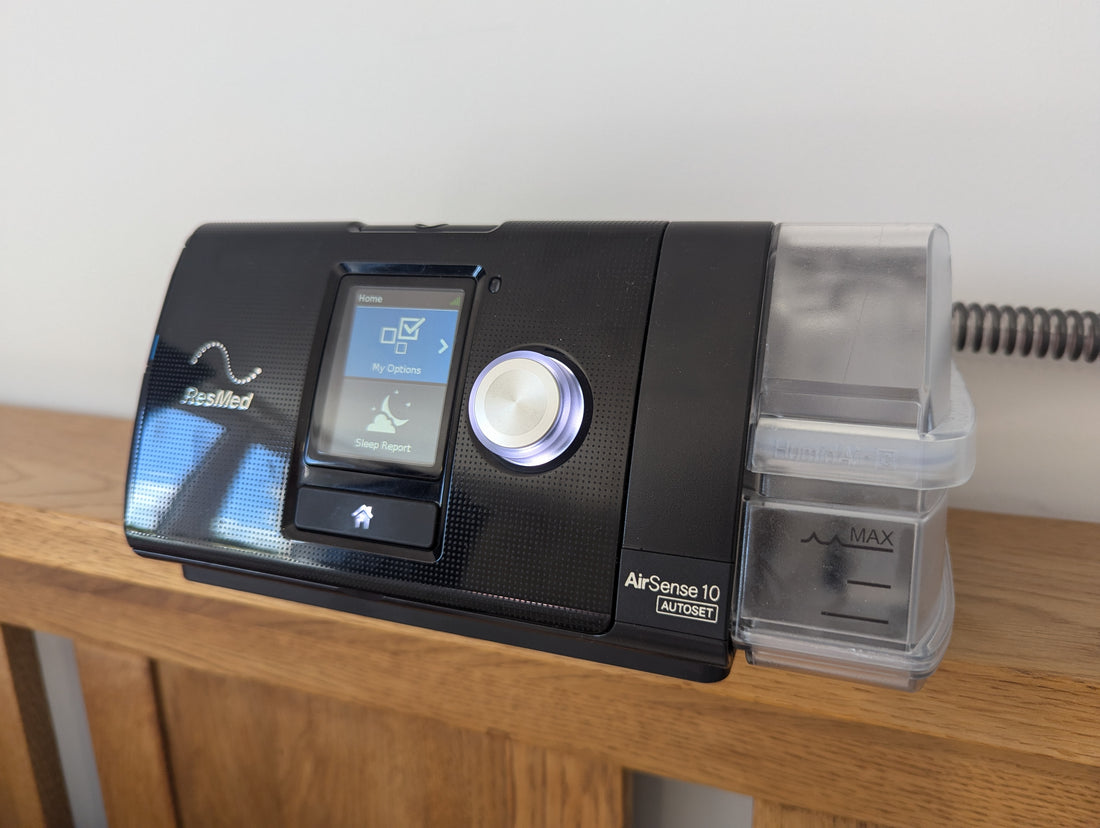Reading time: 9 minutes
What’s inside?
- How long should a CPAP machine last?
- Signs it is time to replace your CPAP machine…
- Lifespans across different CPAP machine brands…
- Extending the life of your CPAP machine…
- Upgrading to a new CPAP machine…
How long should a CPAP machine last?
Well… that depends on who you ask.
Ask the manufacturer and they’ll typically say around 5 years.
Ask the machine and it will generally spit-out a motor warning at around 20,000 usage hours, which is around 8 years if you have the machine running for 7 hours each night.
And… ask the people paying the bills and they’ll likely tell you it doesn't need replaced until it breaks!
In reality, a lot depends on a few factors, such as…
Quality and Brand:
Higher-quality machines from reputable brands often have better durability and longevity compared to cheaper, less well-known options. Just like everything else on the planet you can exchange for cash, there are well built good-quality machines and some that would have trouble blowing the skin off a rice pudding.
Investing in a reliable brand can mean fewer issues and a longer-lasting machine.
If you got your machine through a reputable prescription service or your country’s official healthcare system then you probably have a pretty decent machine.
If you bought it second hand or from a shady online discount place, you may want to check you got what you thought you were getting.
Usage Patterns:
The frequency and duration of use significantly impact the machine's lifespan.
It may seem obvious, but the more miles you put on it… the quicker it is going to wear out. Users who rely on their CPAP machine every night for the recommended 7-9 hours will likely see their machine wear out faster than those who take nights off or have trouble using it for more than a few hours each night.
Maintenance and Care:
Regular cleaning and maintenance are crucial for extending the life of a CPAP machine. Dust, dirt, and moisture can accumulate in the machine and its components, leading to malfunctions or reduced efficiency over time.
Aside from general kit cleaning maintenance, such as masks and hoses, there are 2 simple things you can do regularly to help your machine last longer:
- Change the filter every 2 weeks. Yes, there are various recommendations out there but a dirty filter will quickly impact the quality of air and air pressure you are getting. Filters are the cheapest bit to replace in your entire CPAP setup, so it really may be a good idea to splash-out on this one.
- Keep a new but unused fine-tipped paint brush handy (one you would use to paint the Mona Lisa rather than your garden fence) for getting into all those vents, nooks and crannies. If you do this every two weeks along with the filter change your machine will thank you for it.
Signs it is time to replace your CPAP machine…
Recognising the signs your CPAP machine needs replacement can prevent disruptions in your therapy and ensure you continue to receive effective treatment. Here are some indicators that it might be time for a new machine:
Reduced Performance:
If your machine is no longer maintaining the prescribed pressure or if you notice a decline in its overall performance, it may be time for a replacement. A machine that struggles to deliver consistent pressure can mess-up your therapy.
Unusual Noises:
CPAP machines are designed to operate quietly. If you start hearing unusual noises, such as grinding, whirring, or excessive buzzing, it could indicate internal wear and tear. These noises often signal the machine's motor or other components are failing.
Frequent Breakdowns:
Experiencing frequent malfunctions or error messages is a clear sign that your CPAP machine is nearing the end of its useful life. Consistent issues can disrupt your therapy and lead to poor sleep quality.
Old Age:
Even if your machine appears to be functioning well, it's wise to have the chat with your machine supplier (presuming you don’t pay for your own machine) after it hits eight years old. Over time, the internal components can degrade, leading to less reliable performance. Additionally, newer models may offer significant improvements in comfort, efficacy and medical oversight… if you don’t mind Big Brother keeping an eye on you.
Health Insurance Guidelines:
If you are in a medical system, such as the US, where insurance providers control renewals, many have specific guidelines for CPAP machine replacement, often covering a new machine every three to five years. Check with your insurance company to see if you qualify for a replacement based on their policies. Many insurance cycles last for a 5-year term. This doesn’t automatically mean you need a new machine though.
Lifespans across different CPAP machine brands…
Different CPAP machine brands have varying reputations for durability and longevity. Here are some of the most popular (and generally more reliable) brands that receive good reviews for general performance and lifespan.
ResMed
ResMed is one of the leading manufacturers of CPAP machines, known for its high-quality devices and innovative tech.
The official line is five years, but there’s a real possibility that aligns more to Resmed’s financial plan than to patient usage.
Overall, their devices are renowned for reliability and consistent performance.
Features:
ResMed machines often come with advanced features such as auto-adjusting pressure settings, humidifiers, and user-friendly interfaces, which contribute to their long-lasting nature. Modern machines also come with access to the MyAir app, which provides a guide as to how your treatment is going. Beware though, the app is only a guide and many a user has found strangely unbelievable stats inside the MyAir app.
Philips Respironics
Philips is another major player in the CPAP market, offering a wide range of devices designed to meet various needs.
They are known for their durability and robust construction and will also last for around the 8-year mark if looked after carefully.
Many Philips machines also include features like automatic pressure adjustment, advanced data tracking, and customisable settings, enhancing their overall lifespan.
Fisher & Paykel
Lesser known than Resmed and Philips, Fisher & Paykel is known for producing high-quality CPAP machines with a focus on comfort and user experience with lifespans similar to the other big players.
Their features are pretty similar to their better known stable-mates but many people prefer them for their quiet operation, and user-friendly designs.
As with any product, there are cheaper made versions out there, and even counterfeit branded machines. So, if you are a private buyer it may be safer to stick with reputable sellers rather than buying from an unknown supplier.
Extending the life of your CPAP machine…
So, to maximise the lifespan of your CPAP machine, it's important to follow a regular maintenance routine and take steps to protect the device from damage. Here are some pointers that may help extend the life of your CPAP machine:
Regular Cleaning:
Clean your CPAP machine and its components regularly. As well as filters and brushing air vents etc, remember the mask, tubing and humidifier chamber, if you have one.
Filter Replacement:
Replace the air filters as recommended by the manufacturer as a minimum. Most machines will benefit from a fresh filter every 2-weeks… even if that’s rinsing out a reusable one.
Protect from Dust and Moisture:
The cleaner your sleeping area, the cleaner your machine. Keeping your CPAP machine in a clean, dry environment and avoiding placing where dust and moisture gather will help massively.
Handle with Care:
Be gentle when handling your CPAP machine and its components. Avoid dropping or knocking the device (which is easy to do when travelling with your machine) and handle the tubing and mask carefully to prevent damage. Some users claim to rinse out their hose after washing by swinging it around their head like a cowboy with a lasso. Good idea if you want to stretch your tubing and potentially wreck the end attachments. Not so good for lifespan.
Regular Maintenance Checks:
Periodically inspect your CPAP machine for signs of wear and tear. Check for cracks, leaks, or other damage that may affect its performance. If you notice any issues, it’s probably a good idea to call your machine supplier for advice and to make sure you prevent any further damage.
Professional Servicing:
Some manufacturers recommend professional servicing for their CPAP machines. The user manual should tell you if they do. However, if you didn’t buy your machine, the decision on third-party servicing may not be one you can take.
Upgrading to a new CPAP machine…
Even with the best care, there will come a time when you need to replace your CPAP machine. Upgrading to a new device can offer several benefits, including improved comfort, advanced features, and enhanced performance.
Not all users agree newer is best though. I’ve spoken with more people than I have fingers (okay… not loads but enough to get the message) who have been given a new ResMed AirSense 11 but would happily trade it in for another AirSense 10.
If you are in the market for a new machine, and you get a say in which one you receive, here are some factors to consider when choosing one:
New Technology:
Newer models often come with advanced technology, such as auto-adjusting pressure settings, enhanced data tracking, and integrated humidifiers. These features can improve the overall effectiveness of your therapy and provide a more comfortable experience.
User Preferences:
Consider your personal preferences and needs when selecting a new machine. Factors such as noise level, portability, and ease of use can significantly impact your satisfaction with the device.
Compatibility with Existing Equipment:
If you have a mask or other accessories that you prefer, make sure the new machine is compatible with your existing equipment. Some brands and models may have specific requirements for accessories.
Insurance Coverage:
If your machine is provided under a health insurance scheme, check with your provider to see if they cover the cost of a new CPAP machine. Many insurance plans cover a replacement every five years or so, which can help offset the cost of upgrading.
Professional Guidance:
Consult with your healthcare provider or a sleep specialist when choosing a new CPAP machine. They can provide recommendations based on your specific needs and help ensure you select a device that will effectively manage your sleep apnea.
So… the question of when your CPAP machine is replaced may be different from when your CPAP machine should be replaced, depending on who pays for the replacement.
If you pay for your own machine and you see a newer one with fancier toys attached, you can pretty much fill your boots.
On the other hand, if a 3rd party insurance company or healthcare supplier provides your machine it may take a bit more persuading if you really feel strong enough that it is time for a change.
Overall though, this should not be a decision you need to make often.
Given a good quality machine (and most well-known brands are good quality) should last around 8-years… AND… a CPAP machine motor warning usually comes months ahead of actually giving-up the ghost, it should be a decision you can fairly relaxed about taking.
Keep breathing!
Alan
P.S. If you would enjoy receiving a short weekly email providing other nuggets of sleep and sleep apnea related info, you can join our community by going to this page: https://crackingsleep.com/pages/sign-up
Leave your details and you will receive the very next one.

